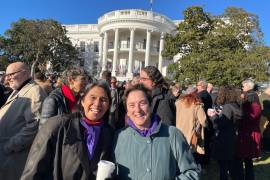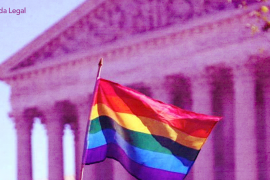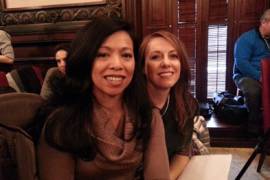
What Happened Today at the Supreme Court
Blog Search
The arguments at the Supreme Court today were electric. The Justices were very engaged and asked many questions of both sides, coming from many different angles. As lawyers say, “the bench was hot.”
Read transcripts and hear audio here.
That’s always a good sign, because it means the Justices have been thinking deeply about the issues. It does seem clear that we will not have a unanimous decision, but, as we walked down the Court’s steps once the arguments had concluded, our legal team and our clients were feeling encouraged.
I remain quite hopeful that, by the end of June, we will reach another civil rights milestone, making it possible for us to devote even more energy to the other important issues that continue to face LGBT and HIV-positive people.
Take a look back at the day with photos and video from our liveblog.
A total of 90 minutes was allotted to Question 1: Does the Fourteenth Amendment require a state to license a marriage between two people of the same sex?
Mary Bonauto, Civil Rights Project Director at Gay and Lesbian Advocates and Defenders, was up first on behalf of the Michigan and one group of the Kentucky plaintiffs. She got out all of three sentences before being interrupted with her first question, but in those three sentences she was able to emphasize how both same-sex and different-sex couples form intimate, committed relationships of mutual support and, if marriage is put off limits to gay people as a class, they and their families will be relegated to a second class status and deprived of equal dignity.
Several of the justices questioned whether the historical understanding of marriage as between a man and a woman should be disturbed by the courts. Mary responded that, although “times can blind us” and that it took time for the courts and society to see our common humanity. She added that, when the 14th Amendment was adopted, the nation became committed to individual liberty and equality, guarantees that it is the courts’ responsibility to uphold.
Justice Ruth Bader Ginsburg emphasized that marriage has changed from an institution involving a dominant and subordinate relationship to one that is now legally required to be egalitarian, and Mary agreed that, as a result, same-sex couples fit well within the nation’s current system of marriage.
In response to Michigan’s argument that we should wait and see whether there are any negative consequences of states’ allowing same-sex couples to marry, Mary explained that waiting is not neutral. Somewhat surprisingly, Chief Justice John Roberts agreed that waiting will have consequences. Justice Antonin Scalia worried that finding that same-sex couples have a constitutional right to marry might compel religious leaders to perform marriages to which they object, but Justice Elena Kagan reminded her brethren that no religious leader has ever been required to perform ceremonies that violate their faith.
Donald Verilli Jr., Solicitor General of the United States, who spoke in support of same-sex couples sharing the freedom to marry, was up next, and he was particularly eloquent. He spoke of how the opportunity to marry is integral to human dignity and that excluding same-sex couples from marriage demeans them and their children. If the Court does not act, he explained, thousands and thousands of people will live out their lives and go to their deaths without their states ever recognizing the equal dignity of their relationships. It was quite moving to hear the top lawyer who represents the United States before the Supreme Court end his remarks: “Gay and lesbian people are equal. They deserve the equal protection of the laws, and they deserve it now.”
Former Michigan Solicitor General John Bursch was pummeled with questions from Justices Stephen Breyer, Ginsberg, Kagan and Sonia Sotomayor. He struggled to put forth the state’s argument that allowing same-sex couples to marry somehow will cause fewer different-sex couples to have children within marriage.
Mary was particularly compelling in her rebuttal. She emphasized the impoverished vision of marriage put forward by Michigan in the case and how people make their own decisions about whether or whom to marry uninfluenced by whether their neighbors can marry.
There then were 60 minutes of argument for Question 2: Does the Fourteenth Amendment require a state to recognize a marriage between two people of the same sex when their marriage was lawfully licensed and performed out-of-state?
Doug Hallward-Driemeier, who leads the Appellate and Supreme Court practice at Ropes & Gray, was very impressive. Forced to focus on how we could win on this question if we lost on the first, he repeatedly emphasized how the couples in Lambda Legal’s Ohio case, the case from Tennessee, and one of the cases from Kentucky, were already married and that, under the Windsor decision of two years ago, that meant they had a liberty interest in their marriage that states needed a strong reason to destroy.
He spoke passionately about the couples who had brought children into their lives in reliance on being married and how they should not be punished when the military, their civilian employer or limited career options required that they move to a state that would not honor their marriage.
Joe Whalen, Associate Solicitor General in the Tennessee Attorney General’s Office, followed him. He conceded that if the couples win on question 1, the state would have to lose on question 2. He also acknowledged that there might be reasons why, even if the couples lost on question 1, they should win on question 2.
At the end, I am left feeling very proud of those who spoke on behalf of the legal teams at Lambda Legal, the ACLU, NCLR, GLAD and our private counsel colleagues, on behalf of all our clients, and on behalf of our community. And while one can never know for sure how the Court will rule based on the questions posed at oral argument, it was particularly meaningful to hear Justice Kennedy ask the lawyer representing Michigan why same-sex couples could not share the “noble purpose” and the non-procreative attributes of marriage that bring married couples dignity. We eagerly await the Court’s decision, expected by the end of June, and we have every reason to continue to hope that the answer to that question will be that there is no reason why we can’t.




